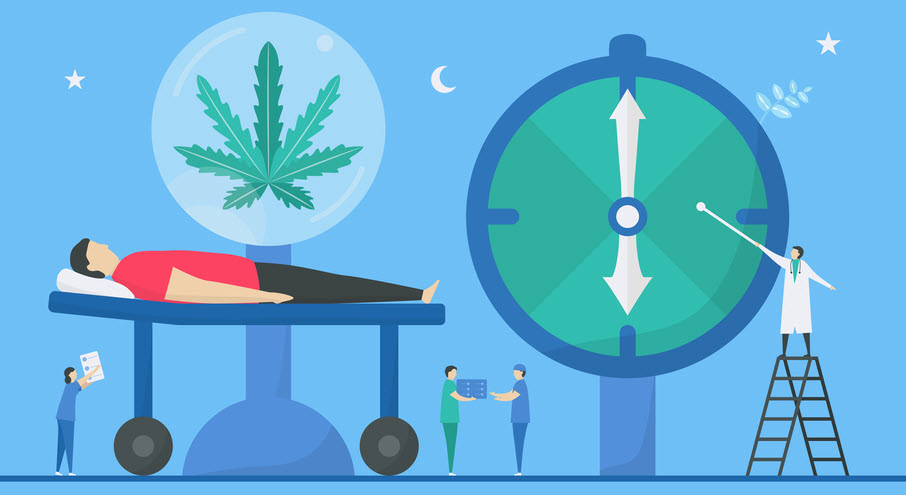
Do you need weed to fall asleep?
New study suggests higher doses of cannabis may not be good for longer sleep – CBD may be the best aid for uninterrupted sleep
The relationship between marijuana use and sleep is far from simple.
While countless people are already benefiting from marijuana’s sleep-inducing properties, there are many others who experience a variety of results: from dreamless sleep to falling asleep much faster, but they tend to wake up in the middle of the night. Researchers sought answers to this phenomenon.
A recent study published in Addictive Behaviors involved the analysis of 178 subjects between the ages of 18 and 35. Information on their cannabis dose per day, frequency of use, demographics, sleep reports, and depressive symptoms was gathered by researchers to understand if they had sleep efficiency, which is defined as the time actually spent asleep in bed, as well as sleep latency, which is defined as how long it takes to fall asleep. They also analyzed the frequency with which people woke up in the middle of the night and found significant differences between recreational cannabis users and non-users.
Interestingly, they found that the amount of marijuana consumed daily, in grams, was associated with an increase in sleep awakenings. “Subjective measurements of sleep did not differ between cannabis users versus non-cannabis users,” the study states. The authors concluded that recreational use of cannabis may be good for sleep onset, although “increased use does not contribute to sleep maintenance.”
We can see from the results of this study that those with insomnia and people who have trouble going back to bed after waking up are better off consuming cannabis earlier in the day and in smaller amounts.
So how do we use cannabis for sleep?
The endocannabinoid system is responsible for regulating many bodily functions, including our circadian rhythm. The endocannabinoid system has two main receptors called CB1 and CB2 to which the cannabinoids in marijuana bind.
THC and CBD have different effects on sleep and the human body, especially the sleep cycle, which can have major implications for people who are already struggling with sleep problems. The study referenced above isn’t the first to suggest that THC may not be ideal for prolonged, sustained sleep; Another 2016 study analyzed the sleep and marijuana use patterns of 98 people. They found that regular use of marijuana was associated with more sleep disturbances.
Maybe it’s because THC can cause anxiety. “It remains possible that insomnia scores were higher among daily marijuana users because marijuana contributed to anxiety, which in turn may have worsened insomnia severity,” the researchers wrote.
However, that doesn’t mean you shouldn’t use cannabis solely for sleeping. If you are one of those people who tend to wake up in the middle of the night after lighting up, CBD is probably the best sleep aid for you.
People with insomnia and anxiety are better off with CBD
Given the results of these studies and other similar research, we can suggest that CBD might work better, especially since THC can cause anxiety and stress in some people. In a study of 103 participants suffering from insomnia, they were given a range of CBD doses ranging from 25 to 175 mg. Researchers found that 25 mg was the most potent dose of CBD that helped fight anxiety, and higher doses of it were best for insomnia. Researchers tracked subjects after each month of the 3-month study, and during the first month, 66.7% of subjects reported improvements in sleep. Unfortunately, there was 25% who said their sleep got worse.
Keep in mind that cannabis compounds affect everyone differently, so even if the studies primarily point to CBD being a better sleep aid, it may take some trial and error. “Research on cannabis and sleep disorders suggests that CBD may have therapeutic potential for insomnia and that THC may decrease the time it takes to fall asleep when going to bed for the first time,” said Smita Patel, DO, MD, MD, neurology and sleep medicine physician at Form.
Since there are numerous conflicting reports, here are some tips to keep in mind when experimenting with cannabis products for sleep:
-
If you’re already prone to anxiety or insomnia, start with low THC doses. In general, 2.5mg of THC is a safe starting point, regardless of consumption method. Take it an hour before your intended bedtime, although you should allow a little longer if you are taking edibles as they take much longer to take effect.
-
If you find that THC works for you, you should gradually increase your dose over the course of a few days or weeks.
-
On the other hand, if THC gives you restless sleep or tends to wake you up in the middle of the night, go the other way and try CBD. It’s safe enough to start with 10mg of THC and work your way up to the desired effect.
-
Try different delivery methods. Vaping and sublinguals usually have the quickest onset of effects, followed by smoking and then edibles. Many people find that because their effects last so much longer in the body, edibles are key to getting a long, sustained sleep, but then again, the effects of marijuana will be different for everyone.
-
Keep track of its effects in a notebook so you can remember which strains, products, and doses have worked best for you.
How do you use cannabis to sleep? Share your experiences in the comments below!
READ MORE ABOUT CANNABIS AS A SLEEP AID BELOW…

CBD FOR SLEEP PATTERNS, WHAT WORKS AND WHAT DOESN’T?
OR..

CBD OR THC IS BEST FOR SLEEP, WE ASKED THE DOCTORS!

Post a comment: